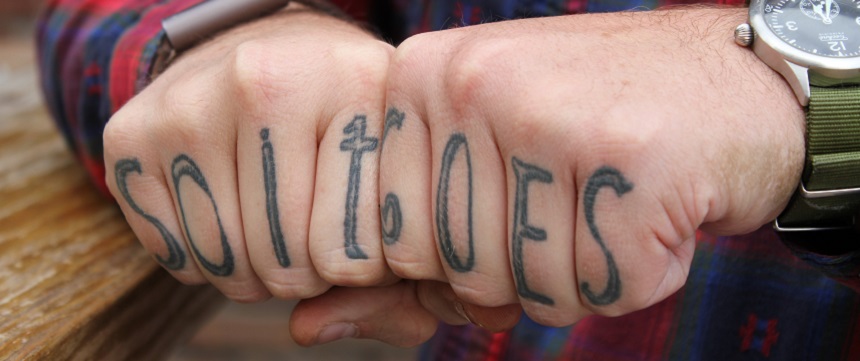Chris: Isn’t mental illness a call to be otherworldly?
The views and opinions expressed in following story are those of the author and do not necessarily reflect the opinions of Mental Health Colorado.
I choose to focus on being satisfied because satisfaction is a good attitude to have and a good attitude will bear you out of the ugliest times of your life.
 It’s Friday night and I’m taking an empty pizza box out to the dumpster behind my apartment building.
It’s Friday night and I’m taking an empty pizza box out to the dumpster behind my apartment building.
Out the back door and into the frigid night, the first thing I see as I turn toward the dumpster is my neighbor squatting against the side of the building, a lost look in his eyes.
My neighbor and I have a sort of incredulous bond. He knows my secret and I know his. I know he has bipolar disorder and he knows I have schizoaffective disorder. And we both trust each other to keep our respective secrets. It’s an incredulous bond because I’d like to think the condition of our minds wouldn’t enter into the equation when determining our worth as human beings in 21st Century American culture; but, sadly, it oftentimes does.
I ask him if he’s okay.
“Help me up,” he says, reaching out with his arms.
I put down the pizza box and help him to his feet. He can barely stand.
I help him inside, asking him if he can make it down the perilous stairs to the basement. “I’m good,” he says after taking a deep breath. Then he tries to follow me up the stairs.
I tell him I’m going to bed and he nods, looking disappointed. And I listen to the creaking stairs as he heads down to the basement, to him fumbling with his keys, and then opening and closing his apartment door before I finish going up the stairs to get ready for bed.
The next day is a brilliant Saturday. A perfect day for me and my lovely dog, Kerrin, to spend some time outside. Me with a tin of tobacco and a cup of coffee and Kerrin on her leash, basking in the sunlight.
My neighbor eventually joins us. I can tell from the look on his face that he has no memory of what happened last night and I remember the pizza box I left on the ground in my effort to help him get back inside.
My neighbor, like pretty much everyone else who’s ever met her, loves Kerrin. She rolls over onto her back and lifts her leg; asking for a belly rub. My neighbor insults Kerrin in an attempt to be endearing as she asks for belly rub after belly rub. I don’t appreciate my dog being insulted so I ask my neighbor to please not call her names. With that request, his whole demeanor changes. He cusses me out. Whereas before we were brothers with an incredulous bond, now there’s a rift separating us and I’m reminded of the second part of keeping his secret: putting up with his unwarranted abuse.
I don’t react to his language. I just shake my head and take a drag of my cigarette. I don’t really know how to react when someone is abusive to me for no reason, though I know I’ve done it enough times to the people I love that I should have some semblance of an idea of how to react.
The topic gets to air conditioners. My neighbor hates everyone who’s rented an air conditioner from my landlord this summer. There aren’t individual meters for the electric bill, so my landlord has to average it out among everyone, and my neighbor loathes having to pay for someone else running their air conditioner.
In a fit of honesty, I tell my neighbor that I’m one of the people who has rented an air conditioner. I’m greeted with his middle finger and a deadpan stare.
Disappointed with the world, I finish my cigarette and Kerrin and I head inside.
He’s angry at the world for who he is, my friend explains when I text her to vent.
And my friend has a point.
It seems to me you have two choices when you’ve been diagnosed with a mental illness. 1: Accept your limitations and try to live as full a life as possible with your (admittedly limited) means. Or 2: Get angry, be bitter and loathe your position in the world.
Attitude is everything with mental illness – how you approach your depression, your delusions, your psychosis has a significant impact on how well you deal with them. Have a bad attitude and you can expect a negative outcome, have a good attitude and you’ll probably have a positive outcome.
I often tell people that I can frame my life however I want. If I want to be bleak, I can talk about how ECT ruined my life, how it stole my memories of my ex-fiancée (and nearly everything else about my life), to such a degree that I don’t even remember what she looks like or how we met or our first date or even the circumstances under which she left me. If I want to be bleak I can talk about how I’m doomed to a life of abject poverty because I’ll never be able to get a job or even obtain the ever-necessary-for-success college degree. That I’ll probably be on disability for the rest of my life and as such will never have enough money to own a house. If I want to be bleak I can tell people that I can’t even drive a car. I can make my life even bleaker – not only can’t I drive a car but I can’t take public transportation. The reflective windows they use on all the buses and trains tend to make me psychotic. I also can’t ride a bike – the medication I take affects my balance to such a degree I can’t ride safely. And the stress of riding a bike is liable to, again, make me psychotic.
Or I can frame my life in a more positive manner. That ECT saved my life. That because I’m on disability, I don’t have to worry about being at work at a specific time every morning. If I need to sleep in, I can sleep in and get the rest I need. If I can’t work because of whatever seemingly-petty reason an employer probably wouldn’t see as valid, I don’t have to and it doesn’t affect my ability to make rent. I get to spend all morning writing. I get to spend all afternoon reading and listening to records on my stereo. I get to spend all day every day with my favorite puppy in the universe. Life is great – I get to create my own structure, my own rules. I’ve never done very well with society’s rules or its structure and to be able to create my own is a huge blessing.
Which reality is the true reality? I suppose both are true. And the reality I embrace is more a reflection on myself than it is commentary on my objective way of being.
In his 2005 commencement address to Stanford University, Steve Jobs calls for the graduates to never be satisfied, to always be looking for more, for better. And who better than the CEO of the company that invented the iPhone, the paragon of perpetual want, to tell us to never be satisfied?
My life with mental illness has only gotten better since I’ve taken the time to step back and be satisfied with the progress I’ve made, when I’ve taken the opportunity to look back and see all the improvements there have been to my life. Mindfulness and meditation play a large role in my recovery and part of that is taking the time to be thankful for what I have.
Progress with mental health is a struggle, but it’s an otherworldly struggle. It doesn’t come through continually stretching yourself thin and taking risks. It comes through drawing on your strength and being thankful for your position in life. It comes from a certain satisfaction with progress made and milestones achieved.
When I celebrated my 7th anniversary of the last day I got ECT this year, part of what I realized was how much progress I’ve made: I’ve moved into a much larger, much nicer apartment. A place that’s much healthier for me than the tiny 350 sq. ft. studio apartment I’d lived in for the past three years. I’ve finished my novel, having put the final touches on it the week before. I’ve reduced my Risperdal dose in half, thus making it easier to get up in the morning. And I’ve just started seeing my psychiatrist every 2 months instead of every month – the longest I’ve ever gone between visits since getting diagnosed ten years ago.
To be thankful, to be satisfied does not mean a lack of progress. Rather it is a path to progress. If, indeed, the only path to progress. It’s true that progress is often two steps forward and one step back – but progress is inevitable.
If I adopted the attitude of never being satisfied, I’d concentrate on the things I’ll never have, the things I’ll never do. I’d concentrate on all the injustices inherent in having a severe, debilitating mental illness in 21st Century America. And that leads to anger at the world, that leads to bitterness, resentment and the ceasing of all the progress I’ve made in the past ten years. I turn into my neighbor, who alienates himself from the world – how allows his illness to create rifts between him and everyone else. Mental illness doesn’t have to burn bridges, it can increase your empathy for your fellow human beings. Because you understand more acutely what it is to suffer and thus can better relate to people’s suffering.
I choose to focus on how I get to spend all day with my dog, who loves me more than anything. I choose to focus on how I get to write every morning and spend the afternoon with good books and my record collection. I choose to focus on being satisfied because satisfaction is a good attitude to have and a good attitude will bear you out of the ugliest times of your life.
To be satisfied is otherworldly; to let our pain, our suffering bring us closer together is otherworldly because no one has a monopoly on suffering. Because to be human is to suffer, to be human is to endure. And having an acute knowledge of the depths of misery that a human is capable of enduring ought to bring us closer together rather than split us apart.
— Chris Feld
If you would like to read more from Chris, you can find his blog at mostlyjustlikeyou.com. His novel, titled “Siren’s Appeal,” will be available in September from High Prairie Press.
———————————————————–
DONATE TO MENTAL HEALTH COLORADO
More than 500,000 Coloradans lack the mental health care they need. You can change that. For more than 60 years, Mental Health Colorado has led the charge in promoting mental health, ending stigma, and ensuring equitable access to mental health and substance use services. It’s life-changing work. Your contribution makes it possible.



